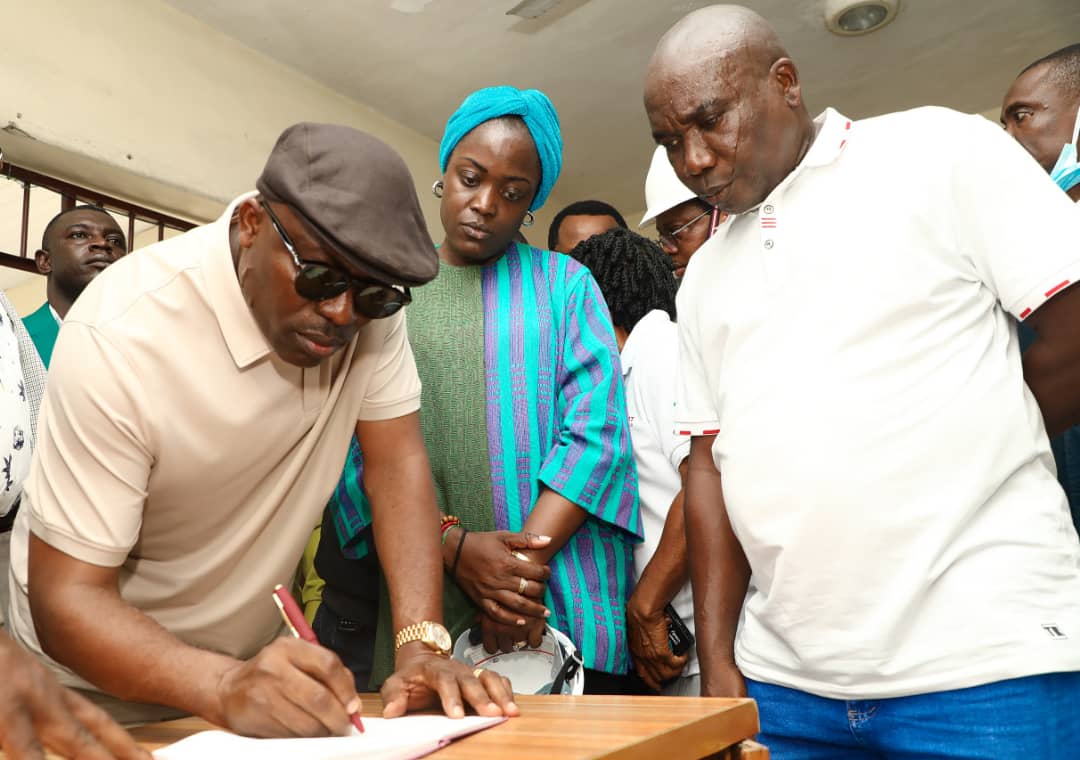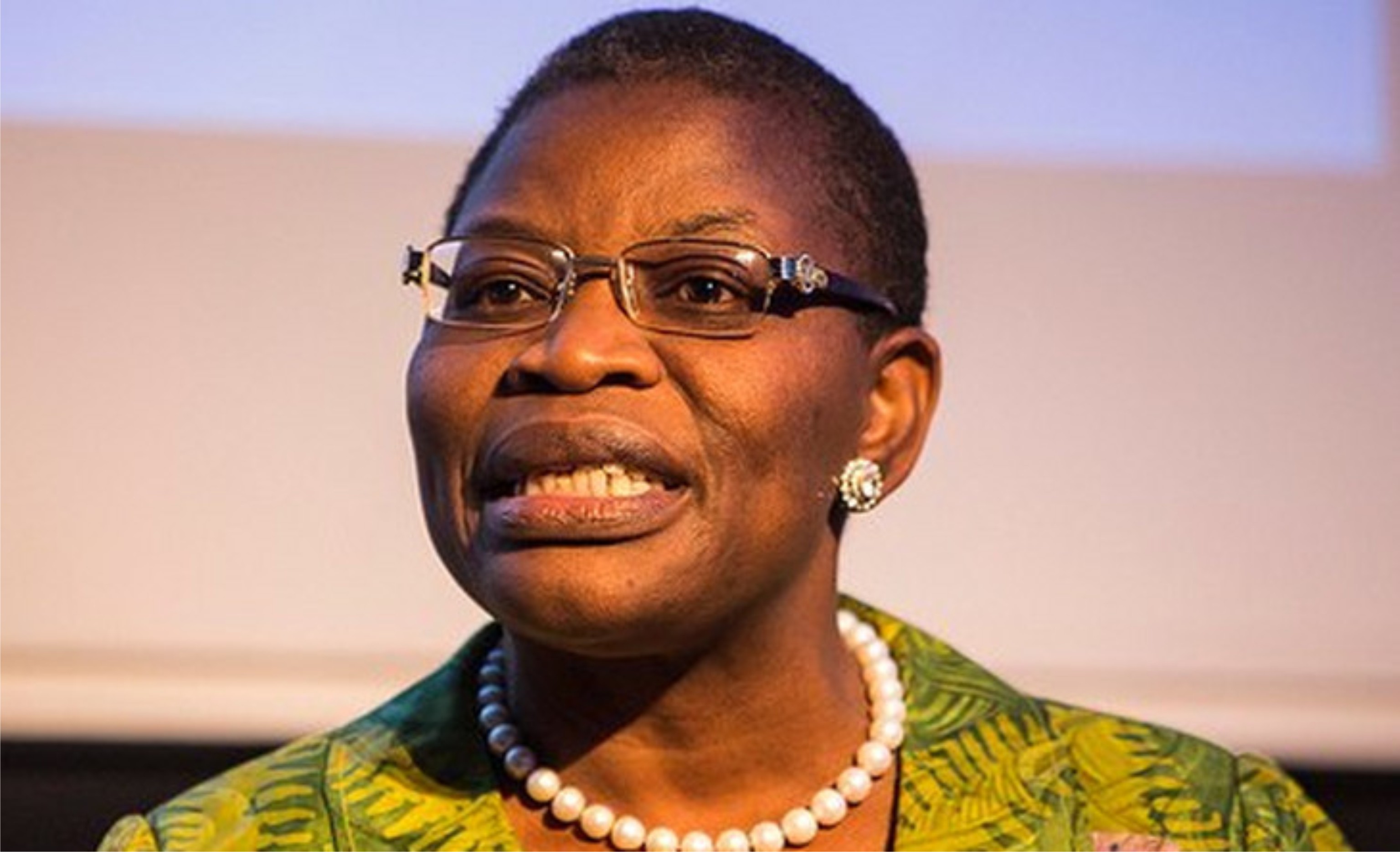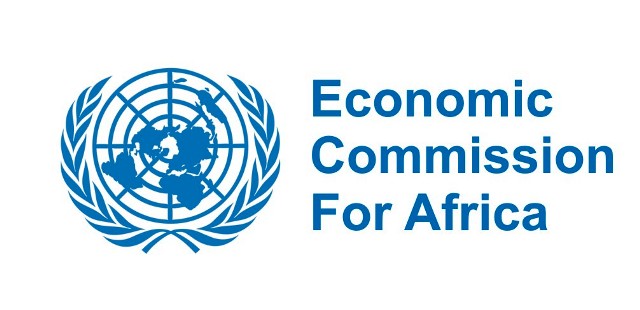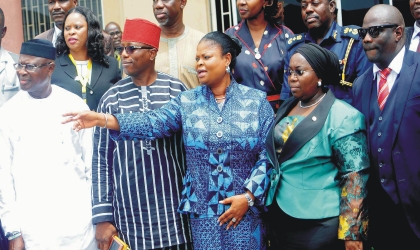News
‘Projected Crude Oil Production Short By 283m Barrels’
Nigeria’s crude oil production when put side-by-side its expected output of 1.88million barrels per day in 2022, was short by a whopping 283million barrels, amounting to roughly $24.55billion.
This figure was arrived at when an estimated conservative price of $85 per barrel for which the commodity sold in the year under review, is multiplied by the 283million barrels deficit recorded during the period.
A further review indicated that while the 2022 budget projected a 1.88million bpd, that is about 58.28million barrels every month or an estimated 700million barrels for the entire year, only 417million barrels were drilled for the entire year.
This represented about 59.57 per cent output for the year.
But on the upside, although the National Assembly pegged the price benchmark at $57 per barrel, oil sold far more than that in 2022, even exceeding $100/barrel at some point.
The figures were released by the Nigerian Upstream Petroleum Regulatory Commission (NUPRC) from January to December, last year.
With its inability to drill up to 60per cent of its expected volume in 2022, the country lost roughly 40per cent of its output to oil theft and sabotage as a result of incessant shut-in of planned output for the period.
A review of the NUPRC data covering the whole of last year revealed that Nigeria only managed to drill 43.3million barrels in January, turning out to be the highest output for the year; 35.2million barrels in February; 38.3million barrels in March and 36.5million barrels in April.
It deteriorated to 31.7million barrels in May; rose marginally to 34.7million barrels in June, before falling to 33.6million barrels in July last year.
In August, Nigeria produced 30.1million barrels, against the 58.2million barrels projection; followed by September in which Nigeria’s output fell to a multi-decade low of 28.1million barrels while in October and November, the country drilled 31.4million barrels and 35.5million barrels, respectively.
Furthermore, when recovery began to set in in December last year, the country managed to drill 38.2million barrels of oil, cumulating to around 417million barrels instead of the forecast of 700million barrels for the year by the Federal Government.
However, the crude oil production figures exclude condensates which are not included in the Organisation of Petroleum Exporting Countries (OPEC) calculation. In 2022, OPEC’s daily production allocation averaged 1.8million bpd.
Last year witnessed one of the worst in the history of the country as it consistently failed to meet its OPEC quota.
However, with the recent concerted effort to end oil theft in the country, there has been some recovery as underscored by the December output data.
Earlier this month, the Minister of State, Petroleum Resources, Chief Timipre Sylva, said Nigeria was working towards meeting its OPEC crude oil production quota of 1.8million bpd by the end of May 2023.
He explained that the Federal Government would continue to improve security along the tracks of the major crude oil pipelines and block every leakage through which crude oil is stolen by oil thieves and pipeline vandals.
But after months of stalling, Nigeria appears to be steadily on its way to meeting its OPEC production quota, hitting 1.235million barrels per day in December.
However, the figure differed markedly from the production of 1.59million bpd announced for the month by the Nigerian National Petroleum Company Limited (NNPC) earlier and the 1.35million bpd by a Bloomberg survey.
In January 2022, out of the expected 1.88million bpd production figure, 1.39million bpd was drilled.
In February, March, April, and May 2022, respectively, oil production fell steadily to 1.25million bpd, 1.24million bpd, 1.22million bpd, and 1.02million bpd, while in June it rose marginally to 1.15million bpd, before falling to 1.08million bpd in July.
In August, the oil sector hit a deadly blow on the Nigerian economy, slumping to 972,394bpd, and further falling to 937,766bpd in September, before rising to 1.014million bpd in October.
The Nigerian government has recently taken a rash of decisions to tackle the embarrassing oil theft situation in the Niger Delta, hiring local security groups as pipelines surveillance contractors.
Among those handed the security contracts was a firm belonging to a former Niger Delta warlord, Mr Government Ekpemupolo, also known as Tompolo.
In addition, the NNPC has announced that it can now monitor Nigeria’s oil infrastructure in real time with its new automated platform and has inaugurated a whistle-blowers scheme which rewards persons who report the activities of suspected oil thieves to the national oil company.
News
Fubara Gives Scholarship To 100 Children, Widows Of Fallen Heroes

Rivers State Governor, Siminalayi Fubara, has given scholarship grant to 100 children and widows of fallen heroes of the Nigerian Legion, Rivers State command.
Presenting cheques to the beneficiaries, Fubara, represented by the Secretary to the State Government, Dr. Tammy Danagogo, advised the students to take their studies seriously.
“Make good use of this opportunity, by dint of hard work. Anyone can be great in any field of choice. I want you to know that the future is bright but it is in your hands.
“Tomorrow, you can be the leader that Nigeria needs at both national and state levels, but you must work hard now. Make good use of this opportunity by being focused on your studies,” he admonished the beneficiaries.
The governor further commended the leadership of the Legion in the State for sustaining the scholarship scheme for the widows and children of fallen heroes.
“The best gift you can give to anyone is education. By educating them, you are empowering them to become good leaders of our society. They are the future of our country, continue the good works,” he stated.
The ceremony was also attended by the National Leader of the Nigerian Legion, Maj. Gen. A.M, Jubril (Rtd), the Commissioner of Education, Dr. Ivy Chiemedum, representatives of Service Chiefs, members of the Nigerian Legion in Rivers State and widows of fallen heroes.
News
FG Panics As #EndBadGovernance Protest Begins, Aug 1 …Yoruba Youths, Ezekwesili Call For Caution

There is palpable fear within the government circle as the plan to organise a nationwide protest against economic hardships have gained significant traction on social media.
President Bola Tinubu met with some traditional rulers in the country and governors from the All Progressives Congress (APC) under the aegis of the Progressives Governors Forum at the Presidential Villa, Abuja, yesterday.
The President’s meeting with the APC governors began at minutes past 1pm, while the meeting with the traditional rulers began at about 2:30 pm when the President arrived at the Council Chamber.
Although the agenda of the two meetings was not disclosed, sources revealed that it may not be unconnected to the planned protests scheduled for August 1-10.
The planned protests, organised under the hashtag ‘EndBadGovernance,’ have gained significant traction on social media even as the organisers remain largely anonymous, with no group officially claiming responsibility.
This meeting follows an earlier conclave of the Nigeria Governors’ Forum on Wednesday night and comes after a last-minute cancellation of the National Economic Council (NEC) meeting earlier scheduled for yesterday.
Leading the delegation of royal fathers are the Sultan of Sokoto, Muhammad Sa’ad Abubakar III, and the Ooni of Ife, Oba Adeyeye Enitan Ogunwusi, while the APC governors delegation was led by its chairman and Governor of Imo State, Hope Uzodimma.
Present at the meeting are Vice President Kashim Shettima, Secretary to the Government of the Federation, George Akume; the National Security Adviser, Nuhu Ribadu, and the Inspector-General of Police, Kayode Egbetokun, and Governor Abdulrazaq Abdulrahman of Kwara State who is the Chairman of the Nigeria Governors Forum, and Hope Uzodinma of Imo State, who chairs the Progressives Governors Forum.
The Minister of Finance and Coordinating Minister of the Economy, Wale Edun, and the Minister of Budget and Economic Planning, Atiku Bagudu, also joined President Tinubu at the meeting.
Both the APC governors and traditional rulers did not brief the press after the two separate meetings.
However, the Coalition of Yoruba Youth leaders have called on organisers of the planned nationwide protest to shelve the idea and remain calm.
President-General of the coalition, Dr Tolani Hassan, said in a statement in Lagos, yesterday, that the apex umbrella body for all Yoruba youth associations and organisations had dissociated itself from the protest.
Hassan, who is also the National President, Yoruba Youths Association Worldwide , however, said that the coalition recognised the plight of Nigerians.
“The economy is unfriendly, the cost of living is outrageous and out of the reach of the common man.
“It is also true that the inflation rate is in the double digit and the unemployment rate in Nigeria is alarming.
“So many graduates are out there with no means of survival. The Federal Government has not employed people in the last couple of years.
“However, the leadership of Yoruba youth leaders do not want a repeat of the ENDSARS saga, hence, our call for protest cancellation and calm,” he said.
The president-general urged the organisers to rather employ other measures to make the government across levels understand the economic hardship in the land.
“There should be a more refined manner of getting our leaders to hear our plights other than protest.
“There are agitations and insecurity in every part of the country, any attempt to have a protest now may cause mayhem, which is not the solution to our pressing challenges.
“The apex body of the entire youths in Yoruba land expressly dissociates itself from the planned protest.
“We will defend the entire South-West against any form of destruction by disgruntled elements, who may want to cause havoc in the region, particularly, Lagos state,” Hassan said.
Similarly, Hassan emphasized the need to embrace unity, pointing out that dialogue is the best way while consultation is a better approach.
He, however, pleaded with President Bola Tinubu to listen to the youth -”his children”, who were agitated.
“We love you Sir, Mr President, but we are hungry and unemployed,” the president-general said.
The youth leader advised Tinubu to directly interface with all the youth leaders in the various geo-political zones, saying the use of intermediaries would not bring results.
He called for a National Youth Summit, where all the various youth leaders would discuss with Mr President and address all the prevailing issues.
Stressing the coalition’s continued support for the President, Hassan urged the Federal Government to review both the monetary and fiscal policies, in the interest of the Nigerian masses.
He called for concerted effort by both the public and organised private sector to engage in massive employment generation and reduction of job losses.
“The economy should be friendly to both local and foreign investors. The power sector should be completely overhauled. This is the hub of the economy,” Hassan said.
He called for the review of educational curriculum from primary to tertiary level and inculcation of practical skills, including agriculture, to make Nigerian youths self-reliant.
The youth leader, who appreciated the inclusion of youths in the Federal cabinet, demanded for more, and urged the Federal Government to regularly engage the youth leadership of the various geo-political zones.
“35 per cent slots should be given to youths in the federal cabinet and federal boards appointment,” he said.
Meanwhile, a former Minister of Education, Oby Ezekwesili, has urged the federal and state governments to handle the planned protests with civility and empathy.
In a statement titled “My Position on the Nationwide Protest of our Young Citizens,” and posted on X, yesterday, Ezekwesili highlighted the distress being experienced by many Nigerians, particularly the youth, due to severe economic hardships.
“All reasonable people know that the majority of our citizens—especially the young ones-are distressed on many counts, from biting economic hardship that is prevalent in the country today. They blame it on bad governance and are therefore demanding an end to it,” she stated.
She criticised the reactions of politicians, public officials, and their allies, which she described as undemocratic and lacking empathy.
She pointed out that news of the planned protests has already caused agitation among government officials.
“I hope the Federal Government and its allies can quickly and wisely cease from threatening those among our citizens who wish to exercise their constitutional right of expression, association, and movement through a nationwide protest,” she urged.
The Bring Back Our Girls Convener called on President Bola Tinubu, the National Assembly, and state governors to seize the opportunity presented by the protests to engage with the dissatisfied youths.
She emphasized the importance of protecting and supporting the protesters to ensure peaceful demonstrations.
“Ensure that the protesters are protected and supported by the police and related agencies like the Civil Defence Corps to protest peacefully and orderly in presenting their demands and agitations to the authorities.
“Be guided by the terrible lessons of the mishandling of the #EndSARS protests,” she advised.
Ezekwesili also recommended that the government respond to the protesters with a clear plan to achieve good governance on the issues being raised.
She stressed the need for politicians and public officials to listen and learn from their citizens.
“I hope that our politicians and public officials will heed counsel and allow themselves the humility of listening and learning from their citizens at a time like this,” she added.
Boye Salau
News
ECA Advises African Countries On Rising Indebtedness

The Economic Commission for Africa (ECA) has called on countries to explore reforms on the common debt relief framework to better address rising indebtedness in Africa.
The Executive Secretary, ECA, Mr Claver Gatete, in a statement presented this at a joint press briefing on the margins of the recently concluded 2024 High Level Political Forum (HLPF).
Gatete highlighted the challenges of accessing financing for the continent’s priorities, especially the concessional funds that are long term and cheaper.
He said the reform of global financing system was urgent, as it could mitigate access to critical resources needed for the implementation of the Sustainable Development Goals (SDGs).
The Tide’s source reports that the African Development Bank (AfDB) said that from 2010 to 2023, Africa’s debt increased by 192 per cent.
The AfDB data also showed that African countries paid 163 billion dollars annually with an external debt stock of 1.1 trillion dollars, the highest ever seen,
According to Gatete, this means that by paying the debt, countries would have very little room to implement the SDGs and the next 10-year programme of the African Union (AU).
Gatete highlighted the need for domestic resource mobilisation in Africa to tackle illicit financial flows and improve taxation.
He also emphasised the importance of developing capital markets to provide long-term resources as part of private sector engagement in Africa.
He said: “There are opportunities in restructured green, blue and sustainability linked bonds that can attract more investors to fund climate-related solutions.
“ECA is working with countries to strengthen domestic resource mobilisation through capital markets to improve self-financing and financial sustainability in Africa.”
He said it was crucial to increase fiscal space and address interrelated issues, including peace building and conflict prevention.
“Also the involvement of the youth in sustainable development processes to ensure long term progress, “ he said.
Ms Christina Duarte, Head of the United Nations Headquarters based Office of the Special Adviser on Africa (OSAA), SDG implementation said only 12 per cent of the 140 targets of the SDG have been delivered.
She said to understand the root causes of the financing challenges faced on the continent, the focus should be on sustainable financing and institutional strengthening in Africa to build resilience.
“So, long-term solutions such as tackling economic and financial flows to address Africa’s debt distress and deliver on the sustainable development goals is very critical,’’ she said.
The HLPF Africa Day aims at highlighting key issues stemming from the Africa Regional Forum on Sustainable Development (ARFSD) and other major consultations.
The joint briefing displays how the AU, the UN Office of OSAA and ECA work together to support African member states in implementing the SDGs and the AU’s Agenda 2063.
The HLPF pulls together member states from around the world to forge pathways to accelerate the implementation of the SDGs.
-
Entertainment3 days ago
-
Rivers3 days ago
Ogu/Bolo Swears In 150 Political Aides …Berates Opposition Over S’Court Judgment
-
City Crime2 days ago
????????????????
-
Sports1 day ago
Chelsea Will Concede Goals This Season – Coach
-
Women1 day ago
Women, Birth And Population Control
-
Features3 days ago
FGM In Nigeria: Need For Its Eradication
-
Niger Delta3 days ago
Dep Gov Restates Bayelsa’s Stance On LG Autonomy, Grassroot Dev …As NULGE Hails Bayelsa’s Support
-

 News1 day ago
News1 day agoThree Die In Lagos Building Collapse

